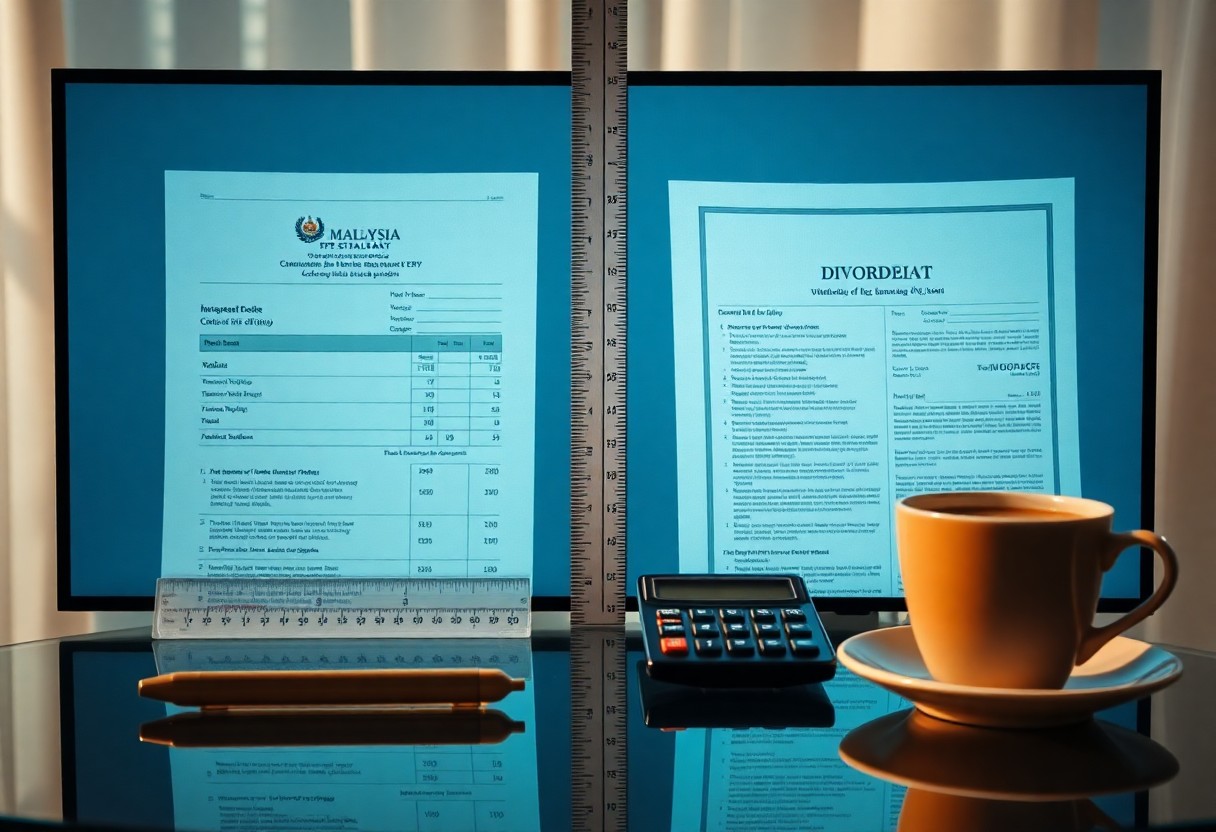Divorce significantly impacts your financial landscape, especially regarding your Employees Provident Fund (EPF) money. In Malaysia, EPF savings are considered marital assets and can be subject to division during divorce proceedings. You must understand that the court may distribute your EPF contributions and dividends based on various factors, including the duration of the marriage and your individual financial needs. Knowing your rights and the legal framework surrounding EPF division can empower you to navigate this challenging process effectively.
Key Takeaways:
- EPF savings are considered marital assets in divorce cases.
- Both spouses can claim a share of EPF funds accumulated during the marriage.
- The division of EPF may not be split 50-50, depending on contributions and duration of marriage.
- Parties can agree on the division or seek a court order if unable to reach a settlement.
- EPF withdrawal is contingent upon the finalized divorce proceedings.
- The division process involves filing an application with the EPF for a share of the funds.
- Legal advice may be necessary to navigate the division accurately and fairly.
The Legal Framework of EPF Distribution in Divorce
The distribution of your Employee Provident Fund (EPF) savings during a divorce is governed by specific legal frameworks that ensure fairness and transparency. Malaysian law mandates that EPF savings accumulated during the marriage are subject to division upon divorce. The key provisions apply to both Muslim and non-Muslim couples, guiding how your contributions and dividends may be shared equitably between you and your spouse.
Key Legislation Governing EPF Division
The primary legislation governing EPF division during a divorce includes the EPF Act 1991 and the Divorce and Matrimonial Proceedings Act 1976. These acts outline the rights of both parties regarding the division of financial assets, including EPF savings, and ensure an equitable approach. They provide explicit criteria for consideration, including the duration of marriage and contributions by each party.
Role of the Malaysian Syariah Court vs. Civil Court
The choice between the Malaysian Syariah Court and the Civil Court significantly impacts how your EPF savings are distributed after divorce. Depending on your marital status and religion, either court may have the authority to adjudicate your case and facilitate the division of assets, including EPF funds.
In the context of divorce, the Syariah Court typically handles cases involving Muslim couples, emphasizing Islamic principles in asset distribution. You may find that the Syariah Court adheres to the guidelines set by Islamic law, allowing for more flexible interpretations of asset sharing. Conversely, the Civil Court applies Malaysian statutory law, focusing on equitable distribution based on factors like financial need and contributions. The court you approach will ultimately influence how your EPF funds are assessed and divided, making it vital to understand the implications of each legal avenue before proceeding.

Criteria for EPF Division
The criteria for dividing EPF savings during a divorce in Malaysia revolve around specific factors defined by the courts, emphasizing equitable distribution. This process considers the duration of the marriage, the contributions of both spouses to the EPF, and any financial needs of the parties involved. Courts aim for fair outcomes by assessing both tangible and intangible contributions made to the household.
Assessing Contributions During Marriage
Your contributions to the EPF during the marriage are assessed based on the amount accumulated and the duration of employment. If you have consistently contributed to the fund, this will be viewed positively in the split. In some cases, even if your spouse did not actively contribute, their support in other areas might be considered, reflecting the partnership’s overall dynamics.
Factors Influencing the Share of EPF Funds
Several factors influence how EPF funds are divided post-divorce, primarily focusing on individual contributions, the length of the marriage, and future financial needs. Some judges factor in the presence of children, the custodial parent’s financial stability, and any sacrifices made during the marriage, such as one partner prioritizing the family over career advancement.
- Individual contributions
- Length of the marriage
- Future financial needs
- Custodial arrangements
- Career sacrifices
These elements work together to create a holistic view of the marriage, assisting the court in making equitable decisions regarding the wealth distribution. Adjustments may occur in cases where a significant disparity exists in economic standing or future earning potential. After evaluating all these aspects, the court aims to ensure a fair resolution for both parties.
- Disparity in economic standing
- Future earning potential
- Contribution to parenting
- Health issues
- Assets outside the EPF
Step-by-Step Process for Claiming EPF After Divorce
Process Overview
| Step | Description |
|---|---|
| 1 | Obtain necessary documents related to your EPF account and marriage. |
| 2 | Submit a divorce certificate and claim form to EPF. |
| 3 | Wait for EPF’s verification and processing of your claim. |
| 4 | Receive confirmation and distribution of EPF funds. |
Necessary Documentation and Requirements
To claim your EPF funds post-divorce, you need several documents, including your divorce certificate, your EPF statement, and a completed withdrawal form. Additional identification, such as your MyKad, may also be required to validate your identity. Make sure all documents are endorsed as necessary to avoid delays in processing your claim.
Timeframe and Procedures for Claim Submission
The timeframe for claiming EPF after divorce typically ranges from 30 to 45 days upon submission of your documents. You must submit the completed withdrawal form along with necessary documentation in person at an EPF branch or online through their portal. Verification of documents may take additional time depending on the complexity of your case or any outstanding requirements from EPF.
After you submit your claim, EPF will verify the documentation, which involves checking the authenticity of your divorce certificate and EPF account details. If all documents are in order, you can expect to receive notifications and potentially your funds distributed within the specified timeframe. Staying proactive and following up with EPF can expedite this process, ensuring you receive your rightful share promptly.

Common Misconceptions About EPF and Divorce
Many people hold inaccurate beliefs about how EPF funds are treated during divorce. Some assume that EPF savings automatically belong to the individual who earned them, while others believe that EPF cannot be touched during divorce proceedings. These misconceptions can lead to confusion and conflict when determining financial entitlements, further complicating an already challenging situation. Understanding the realities of EPF distribution is crucial for making informed decisions about your financial future.
Debunking Myths Surrounding EPF Ownership
One common myth is that EPF savings are entirely personal assets and not subject to division in divorce. In reality, EPF contributions made during the marriage are typically considered marital property. This means that you may be entitled to a share of your spouse’s EPF fund, depending on the circumstances of your divorce. Understanding this aspect can significantly impact settlement negotiations and distribution of assets.
Understanding the Impact of EPF on Alimony and Child Support
Your EPF savings can directly affect the calculations for alimony and child support. Courts consider this money when assessing your financial needs and obligations to your spouse and children. For instance, if you possess substantial EPF savings, it may influence the amount of alimony you are required to pay or receive. Likewise, a lower EPF balance might necessitate a higher alimony or child support allocation to maintain the children’s standard of living.
The interplay between your EPF and alimony or child support becomes vital in divorce negotiations. If you are the higher earner with significant EPF savings, this may be factored into your spouse’s request for alimony, as the court evaluates your ability to support them post-divorce. Conversely, if you’re receiving EPF distributions, it could lessen your need for continual support from your ex-spouse, showcasing how these funds influence both parties’ financial landscapes post-divorce.

Strategies for Fair Negotiation of EPF Assets
Negotiating the division of EPF assets requires clear strategies to ensure fairness. Start by gathering all necessary information regarding your contributions and the total EPF balance. Be transparent about your financial needs and consider proposing a split that reflects both parties’ contributions and future requirements. Utilizing a mediator can facilitate discussions, helping to mitigate conflicts and arrive at a mutually beneficial agreement. Establishing these ground rules can enhance dialogue and minimize emotional strain during negotiations.
Effective Communication Techniques for Couples
Utilizing active listening and empathetic responses can significantly enhance communication during negotiations. Express your feelings clearly and avoid accusatory language to foster a constructive atmosphere. Focus on “I” statements, such as “I feel concerned about our future,” to convey your perspective without instigating defensiveness. This approach encourages openness, making it easier to discuss sensitive financial matters related to your EPF assets.
Seeking Professional Guidance: When to Hire a Lawyer
Hiring a lawyer may become necessary if negotiations reach an impasse or if one party engages in unfair practices. An attorney well-versed in family law can help navigate complex EPF regulations and ensure your rights are protected. Consulting a lawyer early in the process can provide clarity on legal entitlements and prepare you for potential disputes that may arise.
Consider hiring a lawyer if negotiations about EPF assets become contentious or overly complicated. A legal expert can assist you in understanding the nuances of Malaysian laws regarding divorce and EPF. For instance, if your spouse is resistant to a fair settlement or if there are disputes regarding the interpretation of EPF regulations, having professional support can streamline the process. Additionally, a lawyer can provide insights on potential tax implications and help draft binding agreements to formalize the division of assets, ensuring that your interests are adequately represented.
Conclusion
As a reminder, after a divorce in Malaysia, your Employee Provident Fund (EPF) money is subject to division between you and your spouse. The Malaysian courts consider several factors, such as your contributions and the duration of the marriage, when determining the division. You may need to file an application to seek a court order for the division of your EPF savings. It’s important to understand your rights and options regarding this asset to ensure a fair resolution during the divorce proceedings.
FAQ
Q: How is EPF money classified during a divorce in Malaysia?
A: EPF money is classified as marital property under Malaysian law, meaning it is subject to division during divorce proceedings.
Q: What factors determine the division of EPF funds after divorce?
A: Factors include the duration of the marriage, contributions from each spouse, the financial needs of both parties, and the welfare of children, if any.
Q: Can one spouse claim the entire EPF savings after divorce?
A: No, both spouses are generally entitled to a fair share of the EPF savings accumulated during the marriage, barring any special circumstances.
Q: How are EPF withdrawals processed after the divorce is finalized?
A: After divorce, each party must submit requests to the EPF for withdrawal, along with necessary documents, including the divorce certificate.
Q: What happens if one spouse disputes the division of EPF money?
A: If there is a dispute, the matter can be resolved through negotiation, mediation, or by seeking a court order for a fair division.
Q: Are there any penalties for early withdrawal of EPF funds in divorce cases?
A: Early withdrawal may incur penalties such as reduced savings, but in divorce cases, such withdrawals are typically allowed under specific conditions without heavy penalties.
Q: Is it possible to negotiate EPF division outside of court?
A: Yes, couples can negotiate the division of EPF funds amicably through mediation or mutual agreement, which must be documented appropriately.
